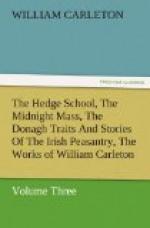When a poor man, about twenty or thirty years ago, understood from the schoolmaster who educated his sons, that any of them was particularly “cute at his larnin’,” the ambition of the parent usually directed itself to one of three objects—he would either make him a priest, a clerk, or a schoolmaster. The determination once fixed, the boy was set apart from every kind of labor, that he might be at liberty to bestow his undivided time and talents to the object set before him. His parents strained every nerve to furnish him with the necessary books, and always took care that his appearance and dress should be more decent than those of any other member of the family. If the church were in prospect, he was distinguished, after he had been two or three years at his Latin, by the appellation of “the young priest,” an epithet to him of the greatest pride and honor; but if destined only to wield the ferula, his importance in the family, and the narrow circle of his friends, was by no means so great. If, however, the goal of his future ambition as a schoolmaster was humbler, that of his literary career was considerably extended. He usually remained at the next school in the vicinity until he supposed that he had completely drained the master of all his knowledge. This circumstance was generally discovered in the following manner:—As soon as he judged himself a match for his teacher, and possessed sufficient confidence in his own powers, he penned him a formal challenge to meet him in literary contest either in his own school, before competent witnesses, or at the chapel-green, on the Sabbath day, before the arrival of the priest or probably after it—for the priest himself was sometimes the moderator and judge upon these occasions. This challenge was generally couched in rhyme, and either sent by the hands of a common friend or posted upon the chapel-door.
These contests, as the reader perceives, were always public, and were witnessed by the peasantry with intense interest. If the master sustained a defeat, it was not so much attributed to his want of learning, as to the overwhelming talent of his opponent; nor was the success of the pupil generally followed by the expulsion of the master—for this was but the first of a series of challenges which the former proposed to undertake, ere he eventually settled himself in the exercise of his profession.
I remember being present at one of them, and a ludicrous exhibition it was. The parish priest, a red-faced, jocular little man, was president; and his curate, a scholar of six feet two inches in height, and a schoolmaster from the next parish, were judges. I will only touch upon two circumstances in their conduct, which evinced a close, instinctive knowledge of human nature in the combatants. The master would not condescend to argue off his throne—a piece of policy to which, in my opinion, he owed his victory (for he won); whereas the pupil insisted that he should meet him on equal ground, face to face, in




